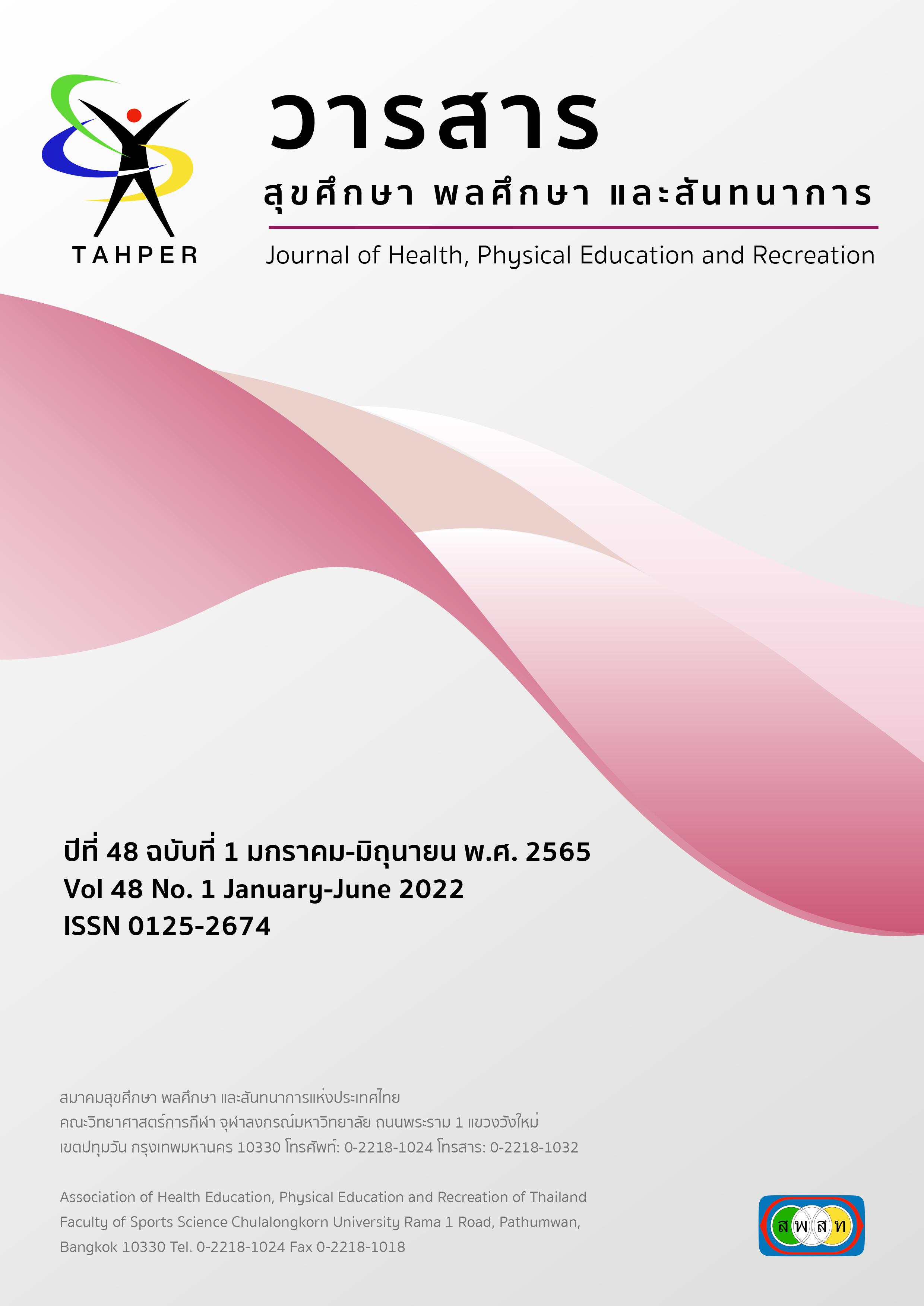ผลของการนอนหลับระยะสั้นในช่วงเวลากลางวันที่มีต่อการฝึกเพื่อเพิ่มความสามารถในเชิงแอโรบิก The Effects of Daytime Napping on Training for Developing Aerobic Performance
Main Article Content
Abstract
บทคัดย่อ
การศึกษาครั้งนี้มีจุดประสงค์เพื่อเพื่อศึกษาผลของการนอนในเวลากลางวันที่มีต่อการฝึกเพื่อเพิ่มความสามารถในเชิงแอโรบิก โดยทำการฝึก 6 สัปดาห์ๆ ละ 5 วันๆ ละ2 ครั้งๆ ละ 1.30 ชั่วโมงโดยในช่วงเช้าฝึกตามโปรแกรมการฝึกความอดทนที่ผู้วิจัยได้ประยุกต์ขึ้น และในช่วงเย็นฝึกทักษะตามโปรแกรมของผู้ฝึกสอนนักฟุตซอล กลุ่มตัวอย่างเป็นนักฟุตซอลชายของโรงเรียนพระบางวิทยา อ.เมือง จ. นครสวรรค์ จำนวน 20 คน แบ่งเป็น 2 กลุ่ม ด้วยวิธีจับคู่ (Match pair) กลุ่ม 1 (จำนวน 10 คน) นอนกลางวันเป็นเวลา 2 ชั่วโมง คือ ในช่วงเวลา 13.30 -15.30 น. และกลุ่ม 2 (จำนวน 10 คน) ไม่นอนกลางวัน ตัวแปรที่ทำการศึกษาได้แก่ VO2 max, Exhaustion time, Lactate threshold, Heart rate recovery และอัตราการลดลงของปริมาณน้ำตาลในเลือด เครื่องมือและวิธีการที่ใช้ในเก็บรวบรวมข้อมูลประกอบด้วย 1) การนอนช่วงเวลากลางวัน 2) แบบทดสอบ Bruce Test และ 3)โปรแกรมการฝึกความอดทนแบบ Interval training และ Continuous training ที่ผู้วิจัยได้ประยุกต์ขึ้น มีค่าความเที่ยงตรงเชิงเนื้อหา (IOC) จากผู้เชี่ยวชาญจำนวน 5 ท่าน เท่ากับ 0.94 4)โปรแกรมการฝึกซ้อมทักษะกีฬาฟุตซอล เป็นโปรแกรมการฝึกที่ผู้ฝึกสอนนักฟุตซอลชาย โรงเรียนพระบางวิทยา วิเคราะห์ข้อมูลด้วยการหาค่าเฉลี่ย ส่วนเบี่ยงเบนมาตรฐาน และใช้ ANOVA แบบวัดซ้ำ (ANOVA repeated measure) นัยสำคัญทางสถิติกำหนดไว้ที่ระดับ .05
ผลการวิจัยพบว่า ค่าเฉลี่ยของ lactate threshold ระหว่างกลุ่มนอนกลางวัน และกลุ่มไม่ได้นอนกลางวัน มีค่า 11.00 และ 8.80 นาที ตามลำดับ ซึ่งแตกต่างกันอย่างมีนัยสำคัญทางสถิติ แต่ตัวแปรอื่นๆ ได้แก่ VO2 max, Heart rate recovery, Exhaustion time และ อัตราการลดลงของปริมาณน้ำตาลในเลือด ไม่แตกต่างกัน จากข้อมูลที่ปรากฏสามารถสรุปได้ว่า ถึงแม้ว่าการนอนกลางวันอาจไม่ส่งผลให้เกิดความแตกต่างในค่า VO2 max, Exhaustion time, Heart rate recovery และอัตราการลดลงของปริมาณน้ำตาลในเลือด แต่การนอนกลางวันช่วยชะลอการสะสมของกรดแลคติกในกระแสเลือด ทำให้ Lactate threshold เกิดขึ้นช้ากว่ากลุ่มที่ไม่ได้นอนกลางวัน ซึ่งถือว่าเป็นผลดีต่อสมรรถนะเชิงแอโรบิก
คำสำคัญ: การนอนกลางวัน ความสามารถเชิงแอโรบิก อัตราการลดลงของปริมาณน้ำตาลในเลือด
Abstract
The purpose of this research was to study the effects of daytime napping on training for developing aerobic performance. Subjects were 20 male futsal players of Phrabangwittaya school, Muang District, Nakhon Sawan . They were divided into 2 groups with match pair design. The first group (n = 10) took a nap for 2 hours from 13.30 - 15.30 while the second group (n = 10) took no nap. Nap group and No-Nap group in training for 6 weeks 5 days per week and 2 times per day. The training program for endurance applied by the researcher was to train in the morning. In the afternoon all players were trained in futsal in their regular training program under their coach supervision. Variables studied were VO2 max,Exhaustion time, Lactate threshold, Heart rate recovery and Blood glucose. Research instruments and methods included 1) Daytime napping program, 2) Bruce Test and 3) Endurance Training Program applied by the researcher. Their content validity of the training program approved by 5 experts was 0.94 4) Futsal training program designed by the coach of Phrabangwittaya school. Data was analyzed by mean, standard deviation and ANOVA repeated analysis. Significant level was set at .05.
Findings were 1) Significant difference exist on means of lactate threshold between the Nap group and No-nap group (11.00 and 8.80 minutes respectively) after the sixth week but other VO2 max, heart rate recovery, exhaustion time and blood glucose shows no significant difference. . In conclusion, daytime napping did not affect VO2 max,exhaustion time, heart rate recovery and blood glucose. However, daytime napping delayed lactate threshold of the nap group which is benefit to aerobic performance.
Keywords: Daytime napping, Aerobic performance, VO2 max, Exhaustion time, Lactate threshold, Heart rate recovery, Blood glucose
Article Details
Critical thinking in journals is the right of the author. The Association of Health Education, Physical Education and Recreation of Thailand is not always required, to create diversity in ideas and creativity.
ความคิด ข้อวิพากษ์ในวารสารเป้นสิทธิของผู้เขียน สมาคมสุขศึกษา พลศึกษา และสันทนาการแห่งประเทศไทยไม่จำเป็นต้องเห็นชอบด้วยเสมอไป เพื่อให้เกิดความหลากหลายในความคิดและความสร้างสรรค์


